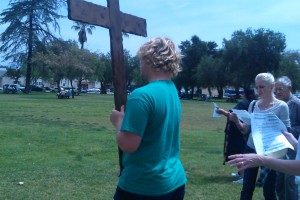 Churches should stay out of politics!
Churches should stay out of politics!
I haven’t heard this advice for years, maybe because Christians on both sides have shown that it’s impossible! You can’t even talk about sports without risking a conversation with political implications. Maybe not everything is political, but there aren’t many degrees of separation. A church that avoids politics will end up with nothing to say, or at least nothing that’s relevant to life as we live it.
Still, crossing that church/politics divide has problems of its own. Many churches cross the divide by making political opinion part of church dogma. Being a member means you either agree with official church teachings or keep quiet. Others welcome opposing points of view, but in a “love the sinner, hate the sin” sort of way. They wait patiently, and condescendingly, for their opponents to see the error of their opinions, repent, and fall in line. In both these cases, church leaders make their church relevant by dictating the terms.
Some people find such definitive answers to be comforting and helpful–one less thing to think about, one less conflict to negotiate. In a world as complicated and as conflicted as ours, maybe we can understand. It’s nice to hang out with agreeable people.
But being Christian isn’t exactly the same thing as being nice. The Old Testament prophets railed against those who would keep the peace at all costs. Sometimes there are things worth fighting for. Relevant is choosing the right battles.
In our Anglican, or Episcopal, understanding, there are three sources of authority: scripture, reason, and tradition. Truth is found in the interaction of these three, and decisions made. The advantage of such a system is that we don’t have to pretend that a worldview founded on the cosmology of 1000 BC or medieval metaphysics works today. Episcopalians don’t pretend that the earth is only 6000 years old, or that slavery can somehow be justified, or that women are inferior, or countless other “biblical” positions are ok. But at the same time, we also know that just because something is the latest and newest doesn’t mean it is the best. The wisdom of the past keeps us grounded today.
All this also means that we will disagree. Timeless truth shows up in different ways. We don’t have definitive rules because the relevant church shows up in other ways.
First, the relevant church gives us a place for conversation. If we quit making the assumption that we have nothing to learn from the other side, we might actually find a solution. Different perspectives bring insights, options and priorities. It’s not that all opinions are equally valuable or true, but no one is God’s private confidante. Somebody else might have something worth hearing. Conversation is relevant.
Second, a relevant church gives us tools for discovering truth. Those authorities of scripture, reason and tradition belong to us all. We can find Christian reasons for our opinions, or change those opinions as needed. We don’t need to wait for someone else to tell us what is true. Establishing our opinions is relevant.
Finally, a relevant church gives us, even in disagreement, the only place to stand. One timeless truth, revealed through the ages: Love wins. The Gospel victory of life over death, love over hate and redemption over sin happens or could happen over and over. A relevant church points those victories out.
#relevant has inspired us to consider a variety of topics: Global warming, violence, homelessness. All these topics have policy and political implications. Trinity’s relevancy isn’t in stifling conversation, or dictating answers. Our relevancy is in finding the Gospel victory in the midst of these topics.
Take issues like “Black Lives Matter”, for example: If we remember that all people are made in God’s image, might we begin to see how there are more options here than demonizing one side or the other, as if there is no reason for the conflict? Or as we consider care for our planet, how might love draw us past the debates over scientific facts and toward love for God’s creation and for the people in it?
#relevant isn’t about being politically correct, right or left. #relevant is bringing the Good News of Love’s victory to the practicalities of life. How might Christ be calling you to take a stand, change your mind or get to work? That’s what’s relevant about our faith.
